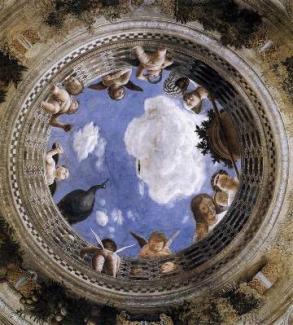Event

The Center for Italian Studies at the University of Pennsylvania, the Italian Consulate General in Philadelphia, Globus & Locus, Centro Altreitalie, and AISLLI (Associazione Internazionale per gli Studi di Lingua e Letteratura Italiana) present,
XXI AISLLI Conference
Italicity
The Languages of Italy in the United States
between Tradition and Innovation
3-5 April 2013
Andrea Mantegna, 1465-1474, Camera degli sposi, dettaglio: oculo del soffitto.
Palazzo Ducale, Mantova.
Plenary speakers will include Piero Bassetti, Daniela Bini, Anna De Meo, Alain Elkann, Fabio Finotti, Hermann Haller, Carlo Ossola, Maddalena Tirabassi, Carlo Vecce, and others.
Call for papers in Italian and in English - New deadline:
The Italic civilization is not only the result of migratory movements from a center to the periphery but is born of the multipolar iteration of phenomena generated by meeting with different cultures. It is the Italics themselves, and not only the Italians, who have produced and promoted Italicity around the world: foreigners who choose the Italian civilization as cultural point of reference.
Unlike other cultures, like the Anglo-Saxon or, in some instances, the Hispanic, the Italic civilization is founded only partially on a linguistic community. The strength of Italicity resides precisely in the ability to combine different ethnicities, languages, and communication codes. This is a crucial issue also for Italian foreign policy. In a glocal world, political and cultural relations must be maintained also with those Italics who not necessarily speak Italian.
How can we build a new subject founded on the need to transcend nationalist assumptions? Can the traditional cultural and linguistic categories be put into question? Can sociolinguistics re-think the ethnic identity grids used so far to interpret its data? Can the notions of “people” and of “minority” be reformulated, starting with the criteria that today inspire them? The “italics” will not find adequate representation unless culture, politics, and the language sciences re-think the criteria according to which they define and describe the nature and the map of the “neo-peoples” of the global world.
Please follow the links below to submit your proposal and to register for the conference. We ask that you register as soon as possible after notification of acceptance of your proposal. The registration fee will be $150 for faculty and $100 for graduate students.
Registration by February 1, 2013
AISLLI:
As the only International Association of Italian Studies at the university level, AISLLI is a member of the International Federation for Modern Languages and Literature of the UNESCO, and is supported by scholars and politicians all over the world. The AISLLI International Conference takes place every three years and is attended by hundreds of participants from many different countries. The proceedings of the Conference are always published. The goal of these events is the involvement of Italian communities in the world. At the University of Pennsylvania, this goal is reached with the collaboration of the Italian Consulate in Philadelphia, the Italian Embassy and Cultural Institute in Washington, and the Italian-American Associations which support the activity of the Center for Italian Studies.
Honorary President: Carlo Ossola, Chaire de Littératures modernes de l'Europe néolatine, Collège de France, Paris.
Presidents: Gilberto Pizzamiglio, Professore Ordinario di Letteratura Italiana, Università di Ca' Foscari, Venezia.
...................Fabio Finotti, Mariano DiVito
Professor of Italian Studies, University of Pennsylvania, Philadelphia.
General Secretary and Treasurer: Bianca Maria Da Rif, Professore di Letteratura Italiana, Università di Padova, Padova
Website Curator: Marina Della Putta Johnston, Lecturer of Italian Studies and Assistant Director, Center for Italian Studies, University of Pennsylvania, Philadelphia
Comitato Scientifico
Piero Bassetti
Fabio Finotti
Hermann Haller
Carlo Ossola
Gilberto Pizzamiglio
